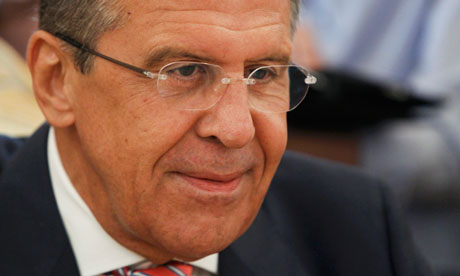- Joined
- Nov 28, 2012
- Messages
- 119
- Points
- 0
Syria no-fly zone would violate international law, says Russia
Comments by foreign minister Sergei Lavrov underline G8 challenge faced by US in trying to gain support for intervention
Staff and agencies
The Guardian, Saturday 15 June 2013 12.11 BST

Russia's Sergei Lavrov said it was not clear that US evidence of Syrian use of chemical weapons would meet international standards of reliability. Photograph: Sergei Karpukhin/Reuters
The Russian foreign minister, Sergei Lavrov, has said that any attempt to enforce a no-fly zone over Syria using US fighter jets and Patriot missiles from Jordan would violate international law.
Lavrov's comments on Saturday underline the challenge facing the US at the G8 summit next week where the White House hopes to get international support for further intervention in Syria.
Russia, which has protected President Bashar al-Assad from three UN security council resolutions aimed at pressuring him to end the violence, vehemently opposes any foreign military intervention in the conflict.
"There have been leaks from western media regarding the serious consideration to create a no-fly zone over Syria through the deployment of Patriot anti-aircraft missiles and F-16 jets in Jordan," Lavrov said. "You don't have to be a great expert to understand that this will violate international law."
The US has moved Patriot missiles and fighter jets into Jordan in the past week, officially as part of an annual exercise, but it made clear that the military assets could stay on when the war games were over.
The Wall Street Journal has reported that a US military proposal to arm rebels fighting against Assad would include a limited no-fly zone inside Syria that could be enforced by US and allied planes on Jordanian territory. The US says it has evidence of Syria's use of chemical weapons, but Lavrov said it was not clear that the US evidence would meet international standards of reliability.
He said the evidence must meet the standards of the Organisation for the Prohibition of Chemical Weapons, which specifies that samples taken from blood, urine and clothing can be considered reliable evidence only if supervised by organisation experts from the time they are gathered to when they are delivered to a laboratory.
Lavrov, after meeting with his Italian counterpart Emma Bonino, scoffed at suggestions that Assad's regime would use chemical weapons now in light of its apparent growing advantage against the rebels.
"The regime doesn't have its back to the wall. What would be the sense of the regime using chemical weapons, moreover at such a small quantity?" he said.
